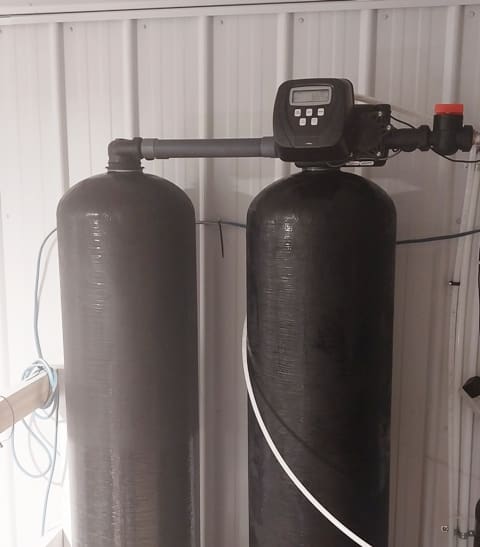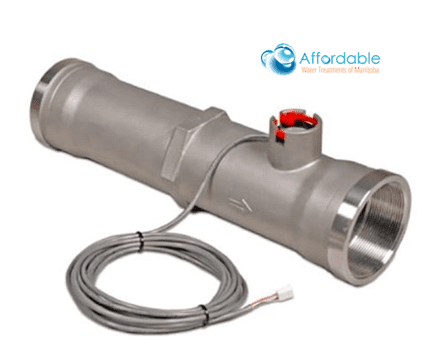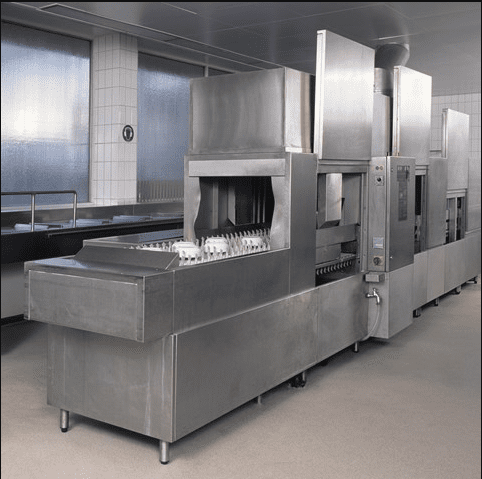
What is a Commercial Water Softener System?
A commercial water softener system provides clean safe water for commercial applications. Water softener treatments purify water by eliminating hardness using resin. The resin in a water softener removes the two minerals that cause hardness, calcium, and magnesium. The softener then renews the resin bed by drawing in a brine solution which knocks off the calcium, and magnesium and flushes them into the wastewater, this process is called regeneration. The soft water then can be passed through a reverse osmosis system to further purify it if needed, for car washes, dental work, and other tasks you might have. A commercial water softener is used in various services, including institutional applications and industrial municipal.

Water softeners for commercial applications
If you use hard water for any length of time you will notice calcium buildup on taps, and shower heads, and hard water eats into your chrome fixtures. Hard water effects are also often detected in water equipment such as dishwashers and sprayers in commercial applications. Industries such as car washes, pharmaceutical companies, hotels, and restaurants benefit from pure soft water to produce quality services and finished products.
The disadvantages of hard water are brought about because it contains a high concentration of minerals. Elevated levels of hard minerals like magnesium and calcium lead to scaling when equipment is exposed to water. Scaling results from mineral deposits on surfaces such as toilets, pipes, clothes, water coolers & heaters, kitchen appliances, etc. Scaling on equipment will reduce their performance and require a lot of maintenance to restore the loss of productivity. Using hard water to wash clothes may produce discolouring and soiling, lowering the fabric quality. As a result, commercial laundries ensure that the water used in washing clothes is of the highest quality.
There are several commercial water softeners in the market, and it is difficult to determine the equipment that will give you the best overall value for commercial applications. The most recommended commercial water softeners are manufactured using Clack valves that are durable and suited for low energy consumption to maximise productivity. Additionally, the resin media should have a high exchange capacity. The softener should also include a properly sized and effective brine tank.
How do Commercial Water Softener Systems Work?
These systems function by using the concept of ion exchange. The process starts when water enters the treatment tank. The water softener tank is filled with ion exchange resin beads engulfed in sodium ions. The sodium ions are exchanged for magnesium and calcium ions responsible for water hardness. Thus, the water turns from hard to soft. The water softener system had a brine tank that ensured continued effectiveness.
This brine tank works by using brine solution, which recharges the resin in the water softener tank with sodium ions after being exchanged for magnesium and calcium ions. The salt is manually added to the tank. This process permits continuous hard water reduction through the regeneration process, which involves exchanging calcium and magnesium ions for sodium ions in the resin beads.
How Often Should a Commercial Water Softener Regenerate?
It would be best to consider several factors before you can determine the regeneration frequency of your commercial water softener system. These factors include the capacity of the full tank, the level of hardness in the water, and lastly, the number of people in the location.
Having said all that, this information can be programmed into the Water Softener along with the measured hardness of the water. Softeners today are made to be on demand which means they come with a turbine to count the gallons of water, and will regenerate as they need to.

What Are the Benefits of a Commercial Water Softener?
Commercial water softeners remove the minerals making the water hard. Therefore, they protect fixtures, appliances, and pipes from lime scaling damage. Soft water decreases unnecessary replacement and repair, energy used in washing, and water bills. Soft water has high cleaning results. Some of the benefits of using a commercial water softener include:
Reduces Hardness in Water
Hard water has high levels of calcium and magnesium. These minerals may damage hair, skin, appliances, and pipes. In a nutshell, water softeners eliminate calcium and magnesium in water, reducing its hardness.
Provides Better-Tasting Water
Hard water typically tastes sour and salty. It may also have a nasty odour. Water softeners remove hardness from the water and during that process decreases the foul smell and creates a chemical residue called sodium bicarbonate, which improves water taste and reduces saltiness.
Soft Water is Less Harmful to Humans
Hard water can harm hair and skin. It may lead to rashes, dryness, skin irritation, itchiness, and other skin problems. Your hair might become stiff and unmanageable. Soft water eliminates these problems. Besides commercial softeners, many manufacturers provide water softeners equipped for residential uses.
It Decreases Scaling
Calcium and magnesium bicarbonate in hard water leads to a chalky layer of lime scaling. This layer builds up, creating deposits on faucets, bathroom tiles, kitchen sinks, pipes, and other water appliances. Water softeners will prevent scaling and any layer formation by taking out the minerals that contribute to this build-up.
Also, a water softener will reduce the level of minerals in the water and prevent lime scaling that leads to clogged pipes. The mineral deposits stick to the walls of the pipes and block the waterway. This eventually decreases the water flow rate and may lead to leakages or permanent damage to the pipes.
Saves Appliances Water and Energy
The scaling caused by hard water may also affect commercial appliances that use water. For example, if water heaters have limescale deposits, their energy intake increases because the heater will first have to heat the scale. The heater will also consume more energy because it will work longer. Hard water may also lead to leakages in water heaters and other appliances, damaging them permanently.
In retrospect, hard water is more harmful to appliances than to human health. It reduces their performance level and life span. Commercial water softeners will reduce the mineral levels that lead to lime scaling. It will also reduce the deposits of calcium and magnesium layers. Appliances and pipe fittings that use soft water perform better and last longer.
Hard water may damage or stain glassware. Additionally, it may make them brittle and easily breakable. With soft water, you will have no problem with this.
Low Cost of Maintenance
Lime scaling caused by hard water leads to frequent replacement and repairs, ultimately increasing the maintenance cost. It also reduces the lifespan and efficiency of pipes, equipment, and other fixtures. Water softeners are a great way of reducing these costs.
When Do I Need to Replace My Commercial Water Softener?
Water softeners are a godsend to anyone who has ever dealt with the nuances associated with hard water. This kind of water leaves mineral deposits that make running or cleaning equipment and water appliances in industrial or commercial facilities difficult because they remove the minerals magnesium and calcium that cause problems with hardness.
Water softeners, like every other device out there, are subject to wear and tear over time. Components will start to break, and electrical problems will occur until they just stop working.
Most water softeners last between 10 and 15 years if taken care of properly. Thus, if you installed your water softener more than a decade ago, it may be subject to replacement. Since there isn’t a set time when you should replace your commercial water softener, you need to identify the signs that your appliance is starting to fail.

What affects the lifespan of your water softener?
Manufacturers build water softeners to withstand daily usage. However, there are a few reasons why your appliance can break down before reaching the end of its usable life.
Quality of water being treated:
The lifespan of a water softener is determined by the quality of water in your business or area. Water that contains a lot of iron or is extremely hard will wear and tear your water softener killing it sooner. In this case, you might want to consider a designated iron remover to protect your softener and stop the staining and buildup of iron in your pipes.
Volume of water being filtered:
The quantity of water being treated is only half of the equation. The volume of water that your water softener regularly treats also affects its lifespan. For example, an office of ten will use more water daily than one or two workers. Also if you are washing trucks, cleaning a big restaurant, or have a large demand for water in some other task, also factors that make the water softener run more frequently because of the higher volume of water that is being processed.
Frequency of use:
As mentioned previously, the hardness of the water being treated determines the lifespan of the water softener. It determines the frequency of use of the water softener as well. The machine will run more frequently to work at filtration and produce the water quality you are looking for.
When to Replace a Commercial Water Softener?
So, when should you replace your water softener? In some cases, the water softener will simply stop working, giving you an obvious sign. In most cases, however, there are subtle signs that your appliance is beginning to fail. Noticing these signs does not necessarily mean that your appliance needs to be replaced. It could mean that your water softener just needs servicing.
Several components, such as the media, can be replaced. The solution may also be as easy as remembering to add salt to the brine tank. Clogged valves may need cleaning, and if you are unsure of the issue, you can contact your residential water treatment expert to look at your situation.
Signs That Your Water Softener is Failing
Hard water spots:
Hard water spots are an undeniable sign of a water softener malfunctioning. Suppose you start noticing mineral deposits building up around your appliances and sinks or hard water spots in these areas. In that case, you may need to call a technician who will either diagnose the problem or tell you to get a replacement unit. These deposits are the crusty build-ups that you find in sinks and pipes. Your linen might also come out of the laundry machine with a crunchy feeling.
Water Pressure issues:
Changes in water pressure may mean that your softener has malfunctioned and lets minerals like magnesium and calcium build up inside the pipes. You should call a technician as soon as you notice this to prevent further problems.
Poor-tasting water:
Another obvious sign is when your water starts to taste bad. Soft water tastes different from hard water. Many people prefer the smooth, soft water taste and will quickly notice increased mineral content in their drinking water. However, you may not notice this problem if you don’t use the water for drinking in your business or facility. The water may have a strange odour or taste, indicating that your water softener isn’t filtering out all the minerals as it should.
Water Feels Different:
The water may feel different. As odd as this sounds, there is a distinct difference in how soft, and hard water feels. Moreover, cleaning products perform better in soft water than in hard. A telltale sign of hard water is when soap refuses to lather. You may notice that you have a hard time cleaning commercial equipment or going through soap a lot faster than usual as you need to use more to get a decent lather. The soft water may feel ‘lighter’ than hard water. Consult your repair technician if your water starts to feel off.
Water becomes salty:
Older water softener models didn’t rinse out the resin as thoroughly as they do today. The models of years gone by typically only had one rinse cycle and left a salty taste in the water. Water softeners today have two rinse cycles or a very long rinse cycle to flush out the leftover salt. Another reason is that the new softeners use soft water to regenerate, which is far more effective and about five times efficient as the old technology. A Softener properly set up and working properly will not leave any salty taste in your mouth.
Difficulty in washing clothes:
If you use your commercial water softener in areas that offer laundry services, then you may notice that the clothes coming out of the water are scratchy and stiff. Fabric softeners can help counteract the stiffness to some extent, but a more practical solution is to ensure that your water softener functions appropriately. Hard water-damaged appliances such as washing machines, dishwashers, water heaters, and all other water appliances. To protect your equipment, you must check and make sure that your water softener functions appropriately.
Benefits of a New Water Softener
If you realise that you need to replace your water softener, then you will be glad to know that the models in the market today are more durable and more efficient than their previous counterparts. Newer technology in the manufacturing process has made new features in the current models that help correctly maintain your system.
Your life will be much easier if you replace your old water softener if you need one. Softened water will give you better-tasting water and softer clothes. The water will also be easier on the skin and hair. Additionally, it will ensure that the water-using appliances last as long as you would expect.
Water softener systems benefit both commercial establishments and residential areas. Commercial places such as restaurants, hospitals, and schools, among others, could use these systems to help with cleaning and skin care. Water softener systems enhance the lifespan of machines and equipment and ensure low maintenance repair and replacement costs.
